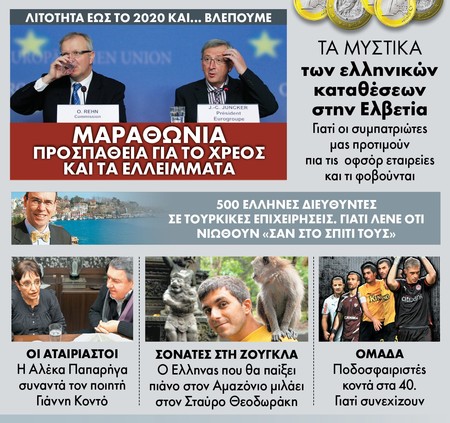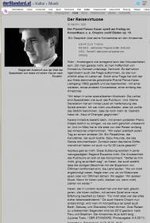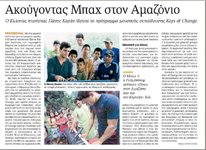Η
χθεσινή μέρα αποδείχθηκε ιδιαιτέρως ενδιαφέρουσα.
We left Pantoja early in the morning, as we were planning to reach Tempestad, which is quite a distance away. But on the way we saw this tiny settlement, which looked so authentic and interesting, that we decided to stop there, and see if we can be invited to play.
By the time we brought out a piano, locals gathered around to see what’s happening. They have never seen piano in their lives, nor have they heard how it sounds. This was one of the most amazing recitals Panos has played, as no one in his audience knew how one is supposed to behave or react while listening to classical music. They sat really really quietly, just listened and observed. We got to talk to some of the people later, and it appears they are really shy. When you ask them if they liked the music, they say yes, but it is very difficult to have a whole discussion with them, as they say very little, and answer questions somewhat unwillingly.
Later in the afternoon we reached Tempestad. It is a bigger place, but when we brought out the piano, no one really was there to listen. The locals started to gather around after they were back from working in the fields, a couple of hours later. But, as it happens here recently - it started to rain! We had to relocate inside the school, and by the time we had done all this, we had quite a decent size audience. The highlight of the recital was a piece by Hadjidakes, a Greek composer. It seemed to resonate very well with the audience.
We’ve spoken to several people after the recital, to get a better idea on how they see Westerners in general, and us in particular, and many of them said that although they are quite isolated, they think it is a wonderful idea, and humans should be able to exchange their cultures, and learn from each other, while at the same time preserving customs and traditions embedded in our roots. We’ve noticed that a couple of people walked away during the concert, and the others suggested that they’ve done so in order to show that they don’t want to accept “Western tradition”. At the same time, it is really interesting to find a mix of views, and to see to what extent music can be used in cross-cultural dialogs.
Having said that, all of the above refers to adults. Children, on another hand, were extremely excited about the music, and the piano. Jose, a very curious four-year-old, approached the piano with great interest, and even played a couple of notes! Benjamin, a shy but very clever nine-year old, was keeping aside at first, but then came around with other kids, and learned to play a whole tune! It is really rewarding to see that kids there are very willing to learn, they are open to everything new, and most importantly - classical music can speak to anyone who is not predisposed.
We need to keep moving downstream the Amazon, and our plan for the next two days in not very clear yet. We will be visiting a very traditional isolated indigenous community, and depending if they accept us or not, we either will stay there longer, so we have more opportunities to communicate and understand them, or we will need to leave and continue our journey across the Amazon!
 The Team
The Team Miklós Csepely-Knorr (Photographer)
Miklós Csepely-Knorr (Photographer) Alex Mouratoglou (Sound Engineer)
Alex Mouratoglou (Sound Engineer) Manu Tilinski (Director of Photography)
Manu Tilinski (Director of Photography) Sandro Ramos (Jungle Guide)
Sandro Ramos (Jungle Guide)





















